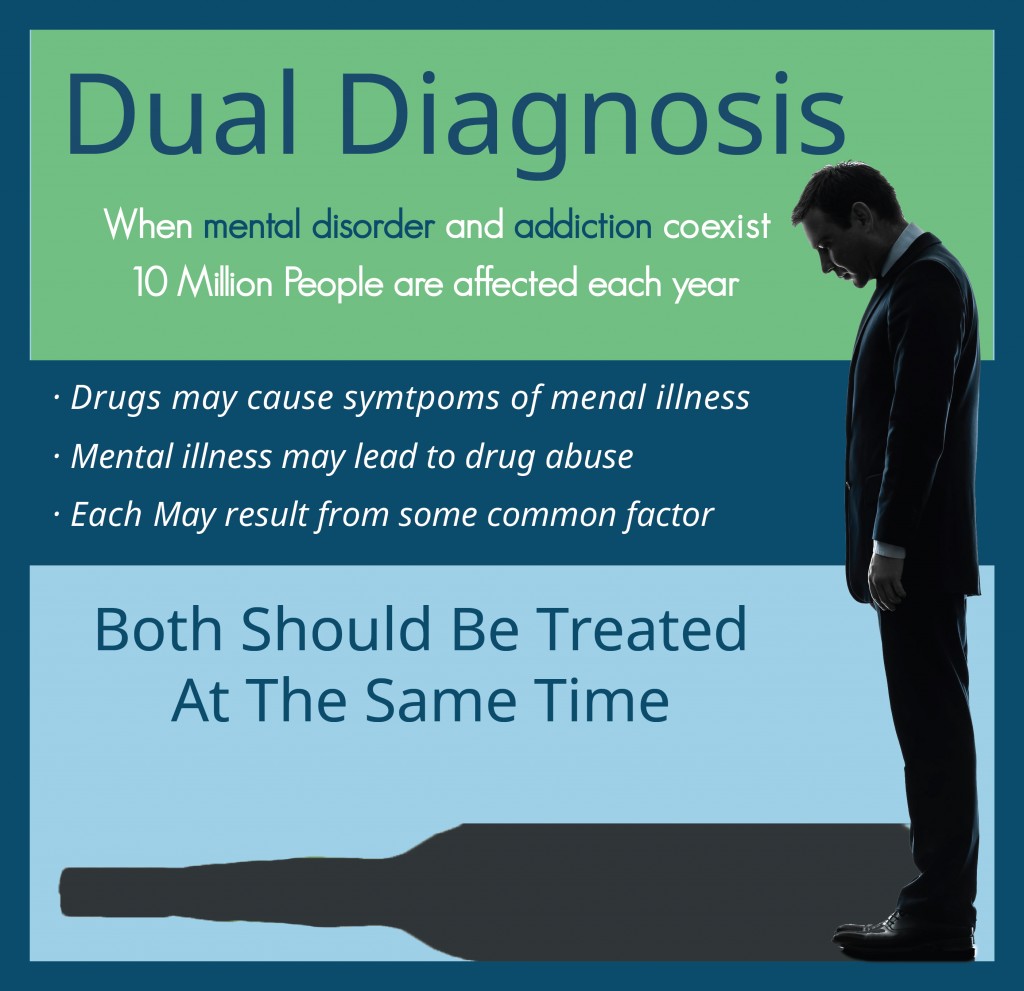What is a Dual Diagnosis Drug Rehab and Do You Need It?
Dual diagnosis—also called comorbidity, or co-occurring disorders—refers to the diagnosis of an individual with both a substance use disorder and a mental health disorder. Dual diagnosis is common, affecting about 10 million people each calendar year according the United Sates Substance Abuse and Mental Health Services Administration (SAMHSA). Because of the commonality between addiction and mental dysfunction, it is extremely important that a drug rehab center treats both the mental and chemical disorder in the brain of the patient. The need for high quality dual diagnosis drug rehabs are on the rise and our team of clinical experts are here to assist you or your loved one in locating the right treatment program to suite both your mental disorder and chemical disorder needs. Please contact us by phone or simply fill out the form and we will contact you.
If You Suffer From One, You Probably Suffer From The Other

It is well accepted is that the presence of one type of disorder increases the risk of having the other. For example, research has shown that people with a mood or anxiety disorder are at twice the risk of being diagnosed with drug abuse or dependence as compared to those without a mental disorder. The converse is also true—individuals with substance use disorders have approximately twice the risk of also having a mood and/or anxiety disorder. In addition, patients with dual diagnoses often have more persistent and severe symptoms than those with either one alone, and symptoms may be more resistant to treatment in patients with both disorders. This is why it is so important to find a drug rehab that specializes in dual diagnosis.
Based on the available research, it is not surprising that drug abuse and mental health disorders are often related. Both drug addiction and mental illness are brain diseases that are associated with changes in brain structure and function. Brain regions affected by substance use overlap with those that are dysfunctional in several mental disorders, such as depression or schizophrenia. This suggests that brain changes associated with one of these disorders may impact the course or outcome of the other.
Common Genetic and Environmental Underpinnings
 Substance use and mental disorders also may have some common genetic and environmental underpinnings. Genetics are known to contribute to vulnerability to both substance abuse and mental illness, and some genes are believed to increase risk to both types of disorders. In many cases, interactions between genes and the environment also play a role. Genetic vulnerability to substance abuse and mental disorders may be especially important in adolescents because their brains are still developing. For example, the introduction of drugs during this time may influence brain development in ways that could increase vulnerability to both later drug use and to mental illness.
Substance use and mental disorders also may have some common genetic and environmental underpinnings. Genetics are known to contribute to vulnerability to both substance abuse and mental illness, and some genes are believed to increase risk to both types of disorders. In many cases, interactions between genes and the environment also play a role. Genetic vulnerability to substance abuse and mental disorders may be especially important in adolescents because their brains are still developing. For example, the introduction of drugs during this time may influence brain development in ways that could increase vulnerability to both later drug use and to mental illness.
What Came First- The Mental Illness or The Addiction?
Although it is well documented that substance use and mental health disorders often co-occur, the precise nature of the relationship is unclear. There are several possibilities:
- drugs may cause symptoms of a mental illness
- mental illness may lead to drug abuse, for example as a form of self-medication of symptoms
- both disorders may be caused by some common factor
The relationship between drug abuse and mental illness may not be the same for all individuals, and in some cases it may be impossible to tease the two disorders apart. However, whenever possible it is helpful to know how drug use and mental illness are related, because it may have implications for drug addiction treatment. For example, if a particular mental illness or disorder is known to lead to abuse of a particular substance, treatment may need to focus on alleviating the mental illness in addition to reducing substance use—the reverse could also be true. In other cases, both problems may need to be addressed simultaneously. Call today to locate a dual diagnosis drug rehab program.
Diagnosis Can Be Difficult
Dual diagnosis complicates diagnosis, course and treatment of both substance abuse and mental health disorders. Diagnosis can be difficult in part because substance use or withdrawal and mental disorders have a number of overlapping symptoms and they are inter-related. Adding to this difficulty is the reluctance of many patients to seek help and the stigma associated with both substance abuse and mental illness. Among patients who do seek treatment, assessment of both substance use and possible psychiatric symptoms is important so that diagnosis can be more accurate and treatment approaches can be better targeted to patient needs.
Both Should Be Treated At The Same Time
Research is still emerging on how best to treat dual-diagnosed patients. However, a guiding principle seems to be that the substance use and mental health disorders should be treated at the same time. Nevertheless, this practice is not routinely used in all treatment programs, and more time and research will be required to more fully implement this approach.
Treatment Approaches For Dual Diagnosis
Treatment approaches include both medication and behavioral therapies. Medications may be used to reduce symptoms of mental illness and/or to treat some types of substance abuse. However, little research has been done on the effectiveness of these medications in patients with both types of disorders. Behavioral therapies, either alone or in combination with medications, have been shown to be key components of successful treatment for both substance abuse and mental disorders.
 Research is ongoing in an attempt to identify specific types of treatment for particular comorbidities and patient populations. For adolescents with dual diagnoses, promising behavior therapies to date include multi-systemic therapy, brief strategic family therapy, and cognitive behavioral therapy. In adult patients with co-occurring substance use and mental disorders, therapeutic communities, assertive community treatment, dialectical behavioral therapy, exposure therapy, and integrated group therapy have shown promise.
Research is ongoing in an attempt to identify specific types of treatment for particular comorbidities and patient populations. For adolescents with dual diagnoses, promising behavior therapies to date include multi-systemic therapy, brief strategic family therapy, and cognitive behavioral therapy. In adult patients with co-occurring substance use and mental disorders, therapeutic communities, assertive community treatment, dialectical behavioral therapy, exposure therapy, and integrated group therapy have shown promise.
If you or someone you know is suffering from substance abuse and mental dysfunction and are in need of a quality dual diagnosis rehab center we can help. Please call one of our experienced counselors or fill out the form.
For More Information Related to “Dual Diagnosis Alcohol and Drug Rehab” Be Sure To Check Out These Additional Resources From DrugRehab.org:
- Gene Therapy For Addiction
- What Is Pseudoaddiction?
- Social Learning Theory Of Addiction Treatment
- The Benefits Of Dialectical Behavioral Therapy (DBT) For Addiction
- The Benefits Of Cognitive Behavioral Therapy (CBT) In Addiction
- Is Addiction Genetic Or Environmental?
National Institute on Drug Abuse. Research Report Series. Comorbidity: Addiction and Other Mental Illnesses. NIH Publication Number 10-5771; 2010: 1-12.


